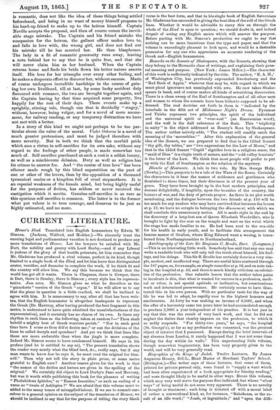CURRENT LITERATURE.
Homer's Iliad Translated into English hexameters by Edwin W. Simeox. (Jackson, Walford, and Hodder.)—We sincerely trust the ensuing legal and parliamentary vacation is not destined to produce any more translations of Homer. Let the lawyers be satisfied with Mr. Dart, the nobility and gentry with Lord Derby,—and if any Liberal is jealous of the glory of that hostile potentate, let him remember that Mr. Gladstone has produced a rival volume, perfect in its kind, though limited to a single book of the Iliad and let him leave that distinguished orator, versifier, and financier to complete the work, if he think fit and the country will allow him. We say this because we think that the world has got all it wants. There is Chapman, there is Cowper, there is Dart, there is Stanley, there is Simcox ; every style has its represen- tative. .Tam sets. Mr. Simcox gives na what he describes as the "pianoforte" version of the Greek "organ." If he will allow na to say that the piano in question is a little cracked, we shall be inclined to agree with him. It is unnecessary to say, after all that has been writ- ten, that the English hexameter is altogether inadequate to represent the Greek (Dr. Hawtrey, after having produced the best fragment in this metre, is understood to have quite admitted the unsatisfactoriness of the representation), and it certainly has no charm of its own. Is there any rhythm in such lines as the following, taken at random?—" Then shalt behold a mighty host of Greek warriors perish." "Nor in such good time have I come as thou did'st desire me ;" or can the divisions of the lines be called dactyls and spondees? And yet we think that lines like these are more endurable than when the jingle is more complete. Indeed Mr. Simcox seems to have condemned himself. He says in his preface (and he is entitled to say so), "The present translation shows the reader very nearly what the blind bard, dec., really says, but if any man wants to know how he says it, he must read the original for him- sell." Then why not tell the story in plain prose, or some metre grateful to English oars? Another reason given for the work is that "the names of the deities and heroes are given in the spelling of the original." We certainly did object to Lord Derby's Juno and Mercury, but was it worth while publishing this book for the pleasure of writing " Phtdakidean Iphiclos," or "Euneos reeonides," or such an ending of a verse as "twain of Asklepios ?" We are afraid that this volume must be added to the many tomes of misapplied labour. If we are to commit our- selves to a general opinion on the subject of the translation of Homer, we should be inclined to say that for the purpose of telling the story blank
verse is the best form, and that in his single book of English Saturnians Mr. Gladstone has succeeded in giving the best idea of the roll of the Greek lines. Whether it would be advisable to carry this on through the whole of the Iliad is open to question ; we should doubt it, and indeed despair of seeing any English metre which will answer the purpose. Before parting with Mr. Simeox's production we ought to say that nothing can be more luxurious than the type and paper, and that the volume is exceedingly pleasant to look upon, and would be a desirable possession for any one who appreciates an accurate rendering of the Greek and—English hexameters.






























 Previous page
Previous page